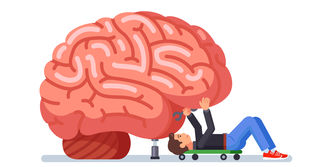Health
Boost Your Brain in 2018, Week 1 Kickoff!
Enhance your future success with better brain health.
Posted January 1, 2018

Ready to try an inspiring New Year’s exercise? Take a few moments to picture yourself – at the peak of health and happiness - one year from now, on New Year’s Day 2019. Close your eyes for about 30 seconds and savor the details…
Now write one word describing each of the following: how you look, what you are doing, and how you feel (e.g. “glowing, dancing, joyful”).
If you believe you can make choices in the next year to bring that three-word vision of yourself to life, then you are in the excellent company of many resilient, dedicated people who have used a “growth mindset” to achieve high levels of success. During decades of research on achievement, Stanford University psychologist Dr. Carol Dweck found that individuals with a “growth mindset” who believed their actions helped determine their success had consistently higher levels of achievement than individuals with a “fixed mindset” who believed their abilities and circumstances were largely unchangeable.
So how does this relate to boosting your brain power? Your success in achieving your three-word vision – or any endeavor – will be significantly greater if you improve the health of the amazing three-pound organ that sits between your ears and governs your actions, emotions, willpower, and motivation.
But to truly boost brain health, we need to distinguish truth from hype and cut through the sea of information that spurs us to try countless activities, supplements, games, and exercises. This is no easy task, especially as the brain health industry burgeons with products that sound promising but are often unproven.
Thankfully, a wealth of science-backed brain health guidance exists, based on decades of exciting research. In honor of making 2018 a banner year for brain health, I will share a science-backed 4-week Brain Boosting Plan, with a different strategy each week.
These brain health strategies share some great features:
- Most are free
- ALL are linked to improved overall health and quality of life
- ALL are science-backed
- These strategies increase the likelihood of achieving your three-word vision in the long term, and provide immediate short-term benefits
Let’s begin with Week 1 with the only brain-health strategy that has been shown to grow new neurons… Cardiovascular exercise!
Cardiovascular exercise (also known as aerobic exercise) includes walking, running, dancing, swimming, hiking, chair aerobics, or hundreds of other activities in which heart rate is elevated. Dozens of research studies have shown that 30 minutes of cardiovascular exercise 3-4 times per week helps improve memory and reduce the risk of Alzheimer’s. But you don’t have to wait to notice the benefits. Even directly after exercise, immediate improvements in attention and learning are evident for many people. In addition, cardiovascular exercise is linked to improved sleep, better cardiovascular health and weight control, reduced cancer risk, and enhanced mood. It is also the only strategy that actually improves mild memory problems (sometimes known as ‘Mild Cognitive Impairment’) for many individuals.
One powerful study showed that older adults who engaged in moderate aerobic exercise three days per week over one year were able to grow the volume of a core memory region of the brain (the hippocampus) by 2 percent, and reverse age-related shrinkage of that region.
There is simply no other intervention, medication, or treatment that has been shown to be more effective in enhancing memory and brain health than cardiovascular exercise.
For Week 1, choose one of the following goals, in consultation with your healthcare provider:
- If you do not exercise regularly, aim for 10 minutes of light cardiovascular exercise – such as walking, water walking, light swimming, chair aerobics, dance, or another heart-pumping activity – at least three days this week.
- If you already do cardiovascular exercise, aim to increase the amount by 5 minutes per workout until you are working out for 30 minutes at least 3-4 days per week. If you are already exercising 30 minutes 3-4 days per week, try to increase the variety of exercises you do (e.g. Monday = speed walking; Wednesday = swimming; Friday = dancing), as some research shows benefit to doing a greater variety of cardiovascular exercises.
If you’d like tips to increase your exercise motivation, and learn more about how exercise enhances the physical structure of the brain, click here.
As we head into Week 1 of 2018, let’s motivate each other and strengthen our collective “growth mindset” by clicking in the “Comments” section below and sharing your three-word vision, and your exercise goal for the week! Here’s to boosting your brain in 2018!
References
Erickson, et al. (2010). Exercise training increases size of hippocampus and improves memory. Proceedings of the National Academy of Sciences of the United States of America.




